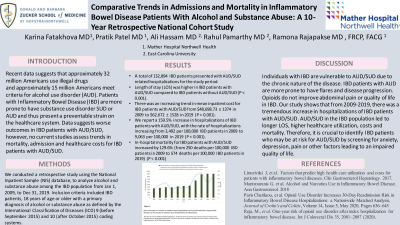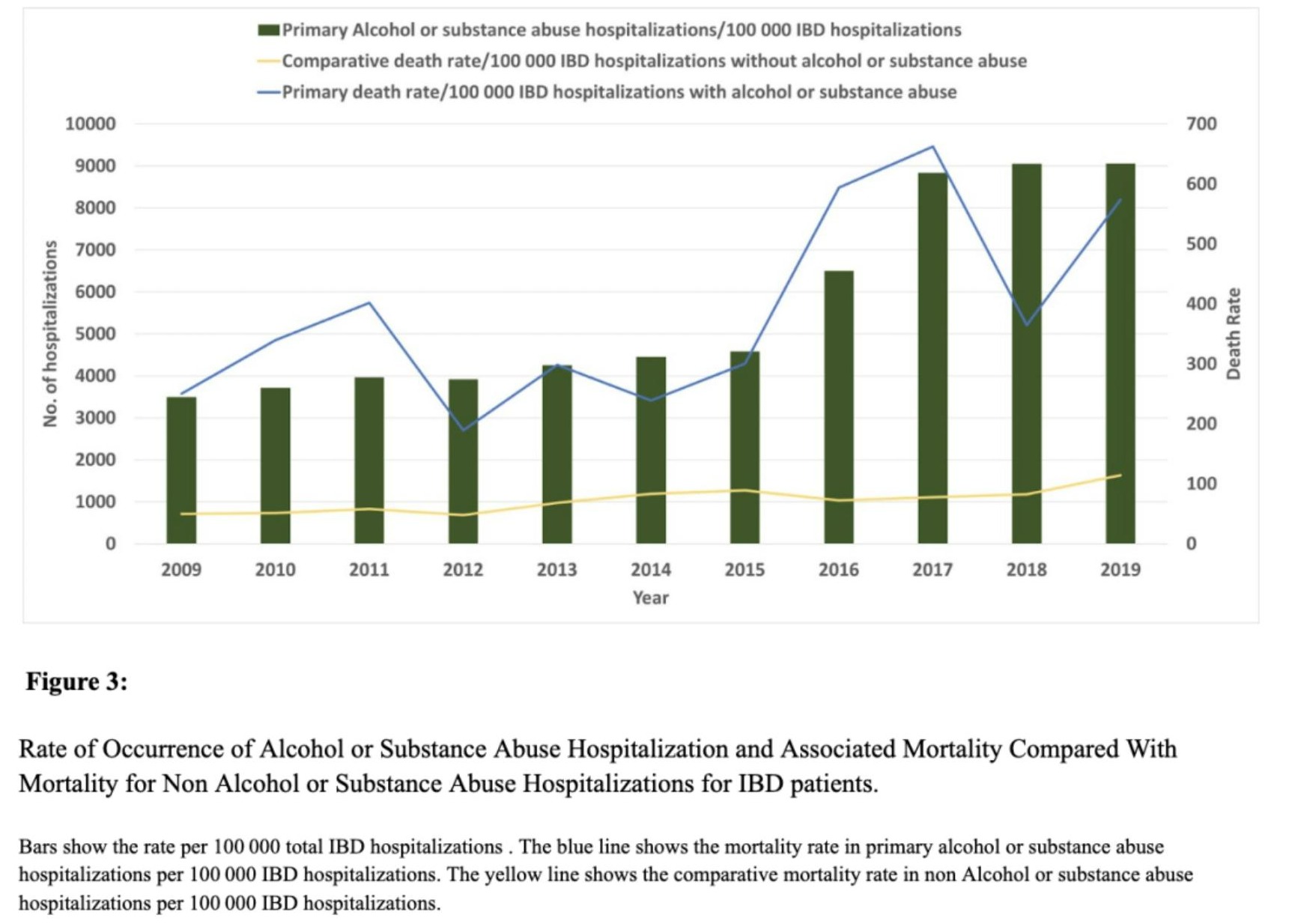Back

Poster Session B - Monday Morning
Category: IBD
B0400 - Comparative Trends in Admissions and Mortality in Inflammatory Bowel Disease Patients With Alcohol and Substance Abuse: A 10-Year Retrospective National Cohort Study
Monday, October 24, 2022
10:00 AM – 12:00 PM ET
Location: Crown Ballroom


Karina Fatakhova, MD
Northwell Health at Mather Hospital
Port Jefferson, New York
Presenting Author(s)
Karina Fatakhova, MD1, Pratik Patel, MD2, Hassam Ali, MD3, Rahul Pamarthy, MD3, Ramona Rajapakse, MD4
1Northwell Health at Mather Hospital, Port Jefferson, NY; 2Northwell Health at Mather Hospital, Middle Island, NY; 3East Carolina University, Greenville, NC; 4Mather Hospital, Port Jefferson, NY
Introduction: Recent data suggests that approximately 32 million Americans use illegal drugs. In addition, approximately 15 million Americans meet criteria for alcohol use disorder (AUD). Patients with chronic medical conditions, such as Inflammatory Bowel Disease (IBD), are more prone to have substance use disorder (SUD) or AUD and thus present a preventable strain on the healthcare system. Data suggests worse outcomes in IBD patients with AUD/SUD, however, no current studies assess trends in mortality, admission and healthcare costs for IBD patients with AUD/SUD.
Methods: We conducted a retrospective study using the National Inpatient Sample (NIS) database, to analyze alcohol and substance abuse (opioids, cocaine, and cannabis) among the IBD population from Jan 1, 2009, to Dec 31, 2019. Inclusion criteria included IBD patients, 18 years of age or older with a primary diagnosis of alcohol or substance abuse as defined by the International Classification of Diseases (ICD) 9 (before September 2015) and 10 (after October 2015) coding systems.
Results: A total of 132,894 IBD patients presented with AUD/SUD related hospitalizations for the study period. Of these patients, 75,172 (57%) were men and 57,696 (43%) were women. Length of stay (LOS) was higher in IBD patients with AUD/SUD compared to IBD patients without AUD/SUD (P < 0.001). There was an increasing trend in mean inpatient cost for IBD patients with AUD/SUD from $48,698.73 ± 1374 in 2009 to $62,672 ± 1528 in 2019 (P < 0.001). We report a 159.5% increase in hospitalizations of IBD patients with AUD/SUD, with the rate of hospitalizations increasing from 3,492 per 100,000 IBD patients in 2009 to 9,063 per 100,000 in 2019 (P < 0.001). In-hospital mortality for IBD patients with AUD/SUD increased by 129.6% (from 250 deaths per 100,000 IBD patients in 2009 to 574 deaths per 100,000 IBD patients in 2019) (P < 0.001).
Discussion: Individuals with IBD are vulnerable to AUD/SUD due to the chronic nature of the disease. IBD patients with AUD are more prone to have flares and disease progression. Opioids do not improve abdominal pain or quality of life in IBD. Our study shows that from 2009-2019, there was a tremendous increase in hospitalizations of IBD patients with AUD/SUD. AUD/SUD in the IBD population led to longer LOS, higher healthcare utilization, costs and mortality. Therefore, it is crucial to identify IBD patients who may be at risk for AUD/SUD by screening for anxiety, depression, pain or other factors leading to an impaired quality of life.

Disclosures:
Karina Fatakhova, MD1, Pratik Patel, MD2, Hassam Ali, MD3, Rahul Pamarthy, MD3, Ramona Rajapakse, MD4. B0400 - Comparative Trends in Admissions and Mortality in Inflammatory Bowel Disease Patients With Alcohol and Substance Abuse: A 10-Year Retrospective National Cohort Study, ACG 2022 Annual Scientific Meeting Abstracts. Charlotte, NC: American College of Gastroenterology.
1Northwell Health at Mather Hospital, Port Jefferson, NY; 2Northwell Health at Mather Hospital, Middle Island, NY; 3East Carolina University, Greenville, NC; 4Mather Hospital, Port Jefferson, NY
Introduction: Recent data suggests that approximately 32 million Americans use illegal drugs. In addition, approximately 15 million Americans meet criteria for alcohol use disorder (AUD). Patients with chronic medical conditions, such as Inflammatory Bowel Disease (IBD), are more prone to have substance use disorder (SUD) or AUD and thus present a preventable strain on the healthcare system. Data suggests worse outcomes in IBD patients with AUD/SUD, however, no current studies assess trends in mortality, admission and healthcare costs for IBD patients with AUD/SUD.
Methods: We conducted a retrospective study using the National Inpatient Sample (NIS) database, to analyze alcohol and substance abuse (opioids, cocaine, and cannabis) among the IBD population from Jan 1, 2009, to Dec 31, 2019. Inclusion criteria included IBD patients, 18 years of age or older with a primary diagnosis of alcohol or substance abuse as defined by the International Classification of Diseases (ICD) 9 (before September 2015) and 10 (after October 2015) coding systems.
Results: A total of 132,894 IBD patients presented with AUD/SUD related hospitalizations for the study period. Of these patients, 75,172 (57%) were men and 57,696 (43%) were women. Length of stay (LOS) was higher in IBD patients with AUD/SUD compared to IBD patients without AUD/SUD (P < 0.001). There was an increasing trend in mean inpatient cost for IBD patients with AUD/SUD from $48,698.73 ± 1374 in 2009 to $62,672 ± 1528 in 2019 (P < 0.001). We report a 159.5% increase in hospitalizations of IBD patients with AUD/SUD, with the rate of hospitalizations increasing from 3,492 per 100,000 IBD patients in 2009 to 9,063 per 100,000 in 2019 (P < 0.001). In-hospital mortality for IBD patients with AUD/SUD increased by 129.6% (from 250 deaths per 100,000 IBD patients in 2009 to 574 deaths per 100,000 IBD patients in 2019) (P < 0.001).
Discussion: Individuals with IBD are vulnerable to AUD/SUD due to the chronic nature of the disease. IBD patients with AUD are more prone to have flares and disease progression. Opioids do not improve abdominal pain or quality of life in IBD. Our study shows that from 2009-2019, there was a tremendous increase in hospitalizations of IBD patients with AUD/SUD. AUD/SUD in the IBD population led to longer LOS, higher healthcare utilization, costs and mortality. Therefore, it is crucial to identify IBD patients who may be at risk for AUD/SUD by screening for anxiety, depression, pain or other factors leading to an impaired quality of life.

Figure: Rate of occurrence of alcohol or substance abuse hospitalization and associated mortality compared with mortality for non alcohol or substance abuse hospitalizations for IBD patients
Disclosures:
Karina Fatakhova indicated no relevant financial relationships.
Pratik Patel indicated no relevant financial relationships.
Hassam Ali indicated no relevant financial relationships.
Rahul Pamarthy indicated no relevant financial relationships.
Ramona Rajapakse indicated no relevant financial relationships.
Karina Fatakhova, MD1, Pratik Patel, MD2, Hassam Ali, MD3, Rahul Pamarthy, MD3, Ramona Rajapakse, MD4. B0400 - Comparative Trends in Admissions and Mortality in Inflammatory Bowel Disease Patients With Alcohol and Substance Abuse: A 10-Year Retrospective National Cohort Study, ACG 2022 Annual Scientific Meeting Abstracts. Charlotte, NC: American College of Gastroenterology.
